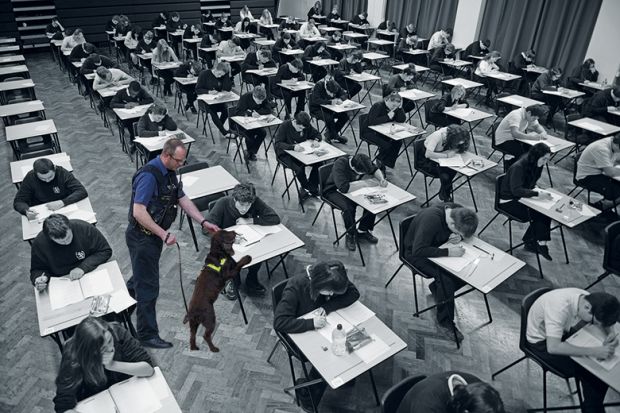‘Turn over your paper now’
Our Deputy Head of Examinations, Mr Gary Tongue, has announced significant changes to the invigilation procedures for this year’s finals.
“We not only have to be alert to such devices as micro-earpieces, smart watches and miniature mobile phones but also, following a recent report by the higher education ombudsman, we need to take into account the law student who recently made use of 24 pages of unauthorised notes written in invisible UV ink.”
This array of devices necessitated a move away from the traditional form of invigilation in which a single disgruntled academic sat behind a desk reading The Guardian at one end of the examination hall. Under the new protocol this single invigilator would be complemented by two sniffer dogs trained in the art of apprehending photocopies and an additional human invigilator who would provide an aerial view of proceedings from the top rung of a centrally placed stepladder.
As a further bulwark against more traditional forms of cheating, students would be prevented from taking sideways glances at their neighbour’s answers by the use of industry-approved head restraints, and deterred from taking toilet breaks by the installation of what Mr Tongue described as “catheter solutions”.
Any student who, in spite of these measures, was discovered to be cheating would be immediately excluded from the examination. Further punishment might then follow although Mr Tongue described the rumour that such students would be taken to a nearby rifle range and shot through the head as “unnecessarily alarmist”.

First among equals
According to our Head of Mark Adjustment, Dr K. T. Rounding Upwards, Poppleton can look forward to having more first-class degrees awarded this year than at any time in its history.
Dr Rounding Upwards explained that this pleasing development was a likely consequence of the Central Examinations Board’s decision to regard a student examination mark of 64 as evidence of first-class ability.
“In the past,” said Dr Rounding Upwards, “we all came to realise that finals marks of 65, 66, 67, 68 and, of course, 69, were so very close to the first-class borderline as to make no essential difference. But this recognition had serious implications for those candidates with an overall 64 who had failed to attain a first by no more than a single mark.
“In the view of the Examinations Board this discriminated against less intelligent students and therefore had no place in a liberal, forward-looking institution or in one that was desperate to award more first-class degrees than any of its nearest rivals.”
In Dr Rounding Upwards’ celebratory words, “Poppleton is well on its way to becoming the first among firsts”.

Letter to the Editor
From: Derek Quintock
Dear Sir or Madam
I was intrigued by recent research showing that universities with distinguished academics as their leaders were more successful than those universities presided over by less accomplished individuals.
This finding aroused my interest in our very own vice-chancellor. I’ve been unable to find anything that reveals his academic credentials. Perhaps you could help. Does our vice-chancellor have any letters after his name?
Our editor replies:
Our present vice-chancellor does not have any letters after his name but we understand that he currently has more than seven figures in his bank account. We hope this clarifies the situation.
Register to continue
Why register?
- Registration is free and only takes a moment
- Once registered, you can read 3 articles a month
- Sign up for our newsletter
Subscribe
Or subscribe for unlimited access to:
- Unlimited access to news, views, insights & reviews
- Digital editions
- Digital access to THE’s university and college rankings analysis
Already registered or a current subscriber? Login



